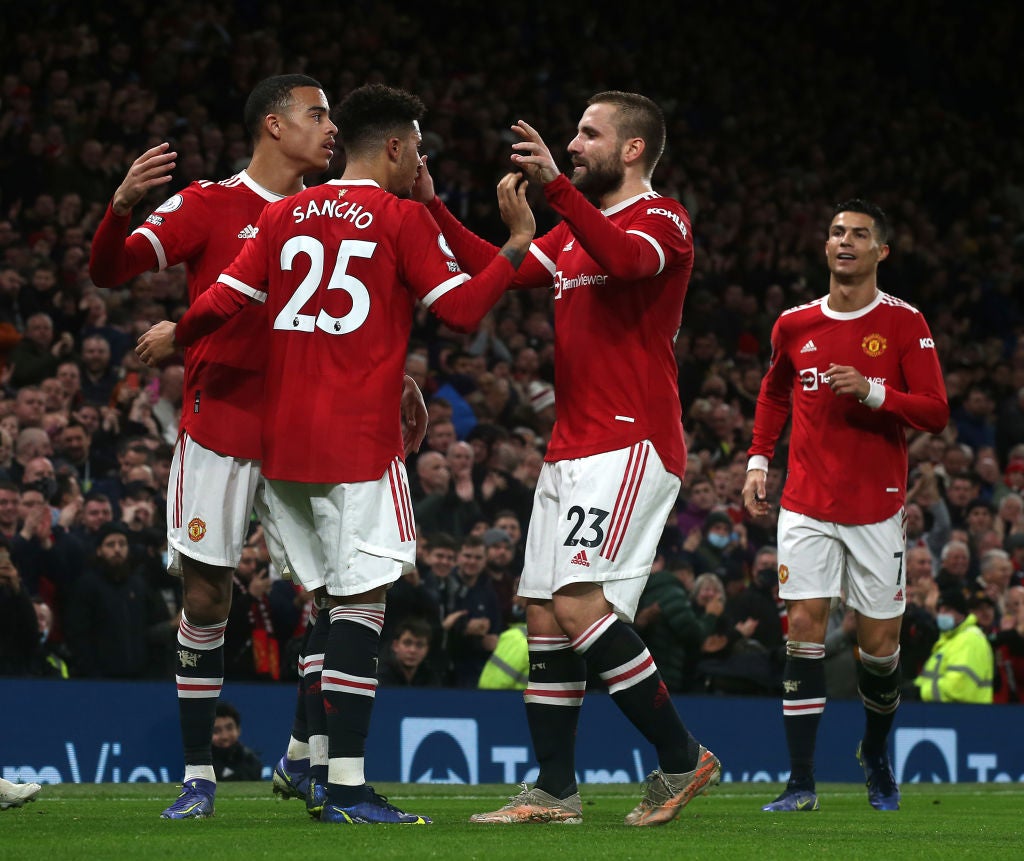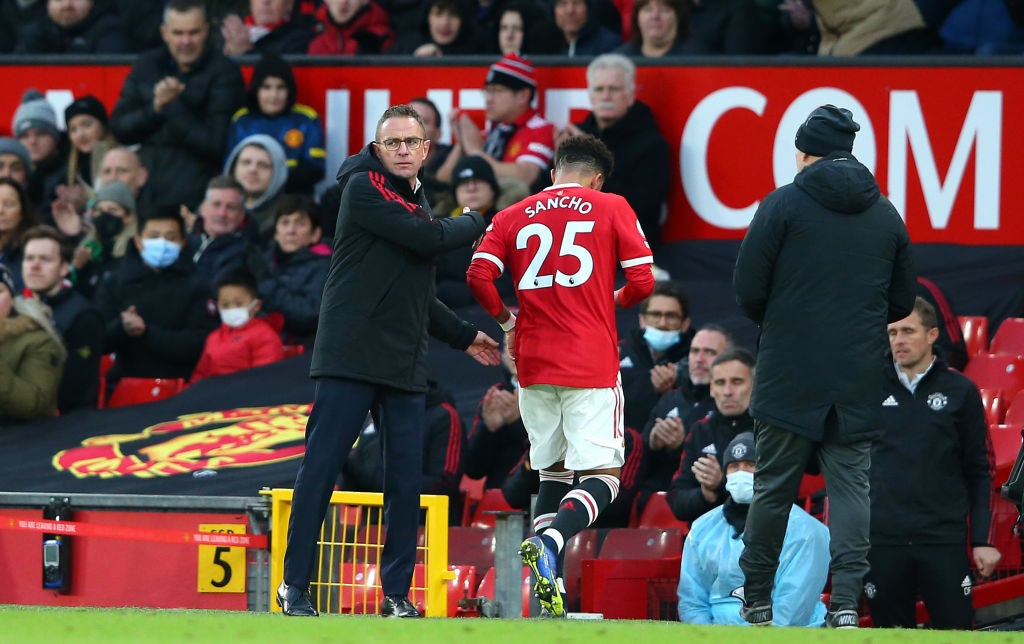Manchester United’s squad is big, imbalanced and bordering on unmanageable
The interim boss is overseeing a squad built in almost complete opposite fashion to the model which he worked with during his time overseeing the successful Red Bull recruitment strategy

Your support helps us to tell the story
From reproductive rights to climate change to Big Tech, The Independent is on the ground when the story is developing. Whether it's investigating the financials of Elon Musk's pro-Trump PAC or producing our latest documentary, 'The A Word', which shines a light on the American women fighting for reproductive rights, we know how important it is to parse out the facts from the messaging.
At such a critical moment in US history, we need reporters on the ground. Your donation allows us to keep sending journalists to speak to both sides of the story.
The Independent is trusted by Americans across the entire political spectrum. And unlike many other quality news outlets, we choose not to lock Americans out of our reporting and analysis with paywalls. We believe quality journalism should be available to everyone, paid for by those who can afford it.
Your support makes all the difference.The irony of the tensions currently playing out at Manchester United is that they may not have come about had they appointed Ralf Rangnick sooner and to a different role.
Though Rangnick’s coaching credentials as the pioneer of modern day pressing have been well-documented during this first month at Old Trafford, he spent the past decade working more regularly - and arguably, more successfully - as a sporting director, overseeing the ambitious Red Bull project.
His job at Red Bull was all encompassing and not limited to buying and selling players but, nevertheless, it involved establishing scouting and recruitment structures which built squads upon a foundation of young, under-valued and otherwise overlooked talent that could develop and play at a top-flight or even elite level.
These players had clear and defined pathways. Many were signed to be sold, with confidence that those recruitment structures would find a suitable replacement. The key was development: of the player but also, and more selfishly, the club.
“We see it like a jigsaw with 500 pieces, and our role is to ensure that we have each piece available to help every player improve,” Rangnick told The Guardian in a 2019 interview. “We help every individual in the whole club develop and flourish.”
United will be able to learn and cherry-pick from that strategy if and when Rangnick moves upstairs into a two-year ‘consultancy' role at the end of the season that still sounds rather nebulous in form. For now though, he is downstairs in the dugout, as a coach rather than a coordinator, managing an unwieldy squad that his track record suggests he would not have built himself.
It is no secret that there are many first team players at Carrington who are either considering or already seeking a move elsewhere.
Paul Pogba, Jesse Lingard and Edinson Cavani have less than six months remaining on their respective contracts, with little sign of new agreements on the horizon. Others like Anthony Martial, Donny van de Beek, Dean Henderson and Eric Bailly are tied down for much longer but with little prospect of earning regular minutes. Some have been stuck in this predicament for the best part of a year or more.
There is not much sympathy for these players and the squad as a whole, though, given that they have now collectively failed to meet expectations under three separate managers. Despite all that time ‘looking in the mirror’ during the first half of the season, it was not them but Ole Gunnar Solskjaer who took ultimate responsibility, paying for their poor start with his job.
Around half of the squad Solskjaer led into this campaign also played under his predecessor Jose Mourinho. A handful have even remained in place since Louis van Gaal’s days in charge. In the eyes of many supporters, the players are the common denominator in nearly five trophyless years.
But such is the way with the modern, post-Ferguson United, no problem can be pinned on one person or one part of the club. With any squad that has this many unhappy players, it is worth looking at its construction.
Of the 25 players registered in United’s Premier League squad, it would be fair to say that only Phil Jones and two veteran goalkeepers Lee Grant and Tom Heaton do not expect to play at least semi-regularly. Juan Mata is a similar but stranger case, a perennial substitute whose minutes have steadily diminished over the last three seasons despite two separate contract renewals.
The other 21 players registered to the Premier League squad would all have begun this season with the expectation of starting, a realistic hope of forcing their way into the line-up, or the fallback of being part of a regular rotation policy.
You can then add Mason Greenwood and Jadon Sancho to that list, as under-21 players who did not need to be registered in the full squad. There is also the 19-year-old Amad, an initial £18m signing last year handed a squad number in the mid-teens by Solskjaer during the summer, though his progression has been delayed by injury.

With around 24 players expecting to play, this is an awkward squad to manage in respect of its size if nothing else, as Rangnick’s predecessor came to find. One source of the frustration among those on the fringes is said to be that Solskjaer promised minutes he either could not or did not deliver on, leaving the players in question feeling let down.
Around 17 members of the squad are at what would be considered peak age, between 24 and 30, and expect minutes. It would be considered a brave and perhaps foolish move to ever drop the oldest outfielder, Cristiano Ronaldo, while the youngest in Greenwood and Sancho already have 312 senior appearances between them. However poor the results may be, this is a squad of established players.
“I do feel I have a squad now that can compete at all levels,” Solskjaer happily declared after Ronaldo’s return last year, when a lot more than a scrap to finish in the top-four appeared possible. “There are international players left, right and centre.” Yet in a World Cup year, it is precisely the fragility of that international status which is making some of those on the fringes desperate to get out and play.
Which is to say nothing of the gaps that remain in this squad despite its size, the most glaring being in the lack of a true holding midfielder. That will only be solved in the transfer market, with more spending, more competition for places, and another shirt peg in the dressing room taken up.
These issues, like many at United, are a product of poor squad-building. The simple answer is to sell players but that has proved far from simple at Old Trafford in the past, whether in the winter or summer windows, and it is not clear whether Rangnick is willing to sanction more than a handful of departures.
Though United’s interim manager has directly said the squad is “definitely not too small”, he also values the insurance it offers with three competitions to play in and Covid-era fixture congestion.
Were he in a longer-term, more concrete position overseeing a wider restructuring of United, you wonder whether he would think the same. As it is, he is a head coach with six months to salvage a season. Give or take a departure here and there, it is likely that he will have to make do with a squad that is big and imbalanced to the point of being almost unmanageable.
Join our commenting forum
Join thought-provoking conversations, follow other Independent readers and see their replies
Comments